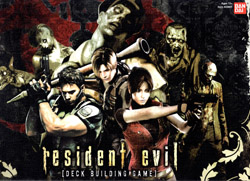In the first post of this series we looked at Dominion and its role in establishing the deck building card game format. In the second and third posts we looked two games that followed closely on Dominion’s success, Thunderstone and Ascension: Chronicle of the Godslayer. In this final post we look at a surprise hit with a questionable heritage. We also take a very brief look at some new titles expected in 2011.
Any game based on a licensed property raises immediate suspicions. More often than not the game is an underdeveloped, cheaply produced knock-off attempting nothing more than to exploit the popularity of the original property. And when that property is a series of video games with questionable movie spinoffs, needless to say the odds were steeply stacked against Resident Evil—The Deck Building Game from amounting to anything more than a marketing gimmick.
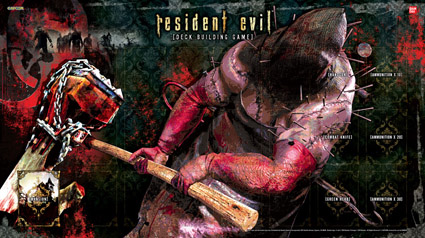
So, with extremely low expectations I had an opportunity to participate in a demonstration game of Resident Evil and was shocked. Game designer Tyla Allinder and publisher Bandai have assembled a first rate adventure game in the form of a deck building card game, the type of game Thunderstone should have been but fell short. What follows is a brief description of game play based on a single session of Resident Evil. It should be noted that Resident Evil features three game modes, story mode, which is described below, mercenary mode, a simpler shoot-‘em-up style of game, and versus mode, which is strictly head to head direct player combat.
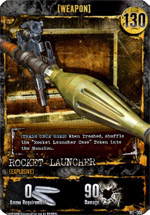 At first glance game play for story mode is similar to Thunderstone. Players have a hand consisting of weapons and ammo; these cards also have a gold value and may be used to purchase new cards from the resource area. Cards in the resource area consist of improved weapons, better ammo, action cards, and miscellaneous items such as healing herbs or dynamite. When a player feels they have sufficient firepower in their hand they may choose to explore the mansion. The mansion is a deck of cards containing mostly virus infected monsters but may also contain healing items and on rare occasions, powerful weapons such as the Rocket Propelled Grenade launcher that cannot be purchased by normal means.
At first glance game play for story mode is similar to Thunderstone. Players have a hand consisting of weapons and ammo; these cards also have a gold value and may be used to purchase new cards from the resource area. Cards in the resource area consist of improved weapons, better ammo, action cards, and miscellaneous items such as healing herbs or dynamite. When a player feels they have sufficient firepower in their hand they may choose to explore the mansion. The mansion is a deck of cards containing mostly virus infected monsters but may also contain healing items and on rare occasions, powerful weapons such as the Rocket Propelled Grenade launcher that cannot be purchased by normal means.
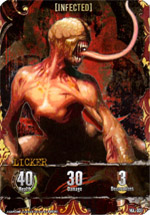 Choosing to explore the mansion involves revealing the top mansion card. If it’s a monster and your hand contains more firepower than the monster’s strength, the monster is defeated and becomes a trophy. If your hand does not contain enough firepower the monster will fight back, inflicting damage and possibly other effects. The great thing about Resident Evil is that exploring the mansion involves genuine risk, something Thunderstone’s dungeon lacks and this makes all the difference in keeping the game tense and interesting.
Choosing to explore the mansion involves revealing the top mansion card. If it’s a monster and your hand contains more firepower than the monster’s strength, the monster is defeated and becomes a trophy. If your hand does not contain enough firepower the monster will fight back, inflicting damage and possibly other effects. The great thing about Resident Evil is that exploring the mansion involves genuine risk, something Thunderstone’s dungeon lacks and this makes all the difference in keeping the game tense and interesting.
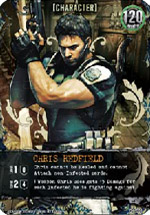 Another interesting feature of Resident Evil is the use of player characters. At the start of a game each player is randomly assigned one of 10 characters drawn from the video game series. Each character starts with a unique deck and has special abilities which can be improved upon (leveled up) as the game progresses. These special abilities have the potential to send players along individual paths to victory, a refreshing departure from the perfect symmetry seen in other deck building games.
Another interesting feature of Resident Evil is the use of player characters. At the start of a game each player is randomly assigned one of 10 characters drawn from the video game series. Each character starts with a unique deck and has special abilities which can be improved upon (leveled up) as the game progresses. These special abilities have the potential to send players along individual paths to victory, a refreshing departure from the perfect symmetry seen in other deck building games.
Overall, Resident Evil shows a lot of promise. The game can run a little long when played in story mode, hopefully familiarity with the game will shorten the play time. The game could also use more variety in actions and resources available for purchase, something expansions are sure to address.
 With the success of Dominion more deck building games are sure to follow. Heroes of Graxia (actually published in 2010) features player on player combat in a fantasy setting. The forth coming Eminent Domain introduces a science fiction theme with galactic colonization and civilization building. The highly anticipated NightFall will bring vampires, werewolves, and ghouls to the deck building format. Not all of these games will be successes but one thing is clear; the deck building format is just getting started.
With the success of Dominion more deck building games are sure to follow. Heroes of Graxia (actually published in 2010) features player on player combat in a fantasy setting. The forth coming Eminent Domain introduces a science fiction theme with galactic colonization and civilization building. The highly anticipated NightFall will bring vampires, werewolves, and ghouls to the deck building format. Not all of these games will be successes but one thing is clear; the deck building format is just getting started.
Resident Evil—The Deck-Building Game may be found at your full service local game store, from Amazon.com for about $24.86, and from many other online retailers. The promotional playmat pictured after the jump is a game accessory and not included in base game.
When not playing games, Bob Gallo is a computer programmer specializing in Flash and interactive application design living in the Charlotte, NC area. Bob got his gaming start in the mid 1970s with traditional hex-and-counter war games and has played nearly all types of games including role playing games, miniatures, collectible card games, video/PC games as well as traditional board and card games.










